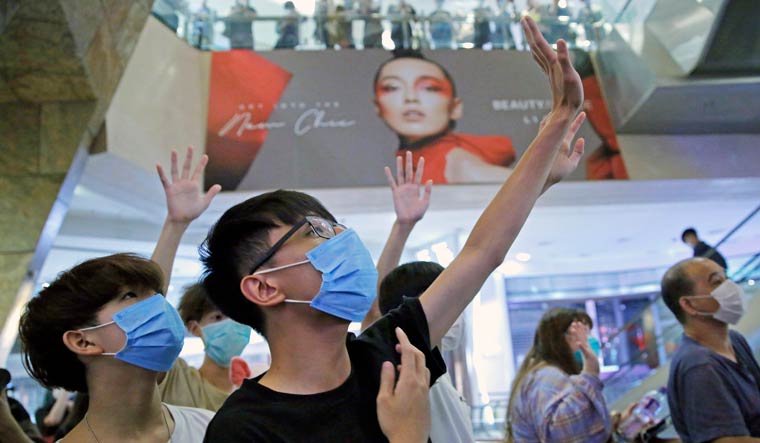Over 1,000 of Hong Kong’s 1,051 COVID-19 patients have recovered. While it is premature to hail the end of the spread of COVID-19 in a city—something Singapore and Wuhan have both discovered—the reduced profile of the virus in the city has brought attention back to the last big issue in the region: Pro-democracy protests against Hong Kong Chief Executive Carrie Lam.
On Wednesday, the date of Lam’s 63rd birthday, hundreds defied social distancing measures and gathered in malls according to a Reuters report. Holding up five fingers, they reiterated the five demands that were at the front of the mass protests that dominated 2019: Withdrawing the controversial extradition bill, setting up an independent commission of inquiry into police brutality, amnesty for protesters who had been arrested, a halt to the government’s categorisation of the protests as riots and the implementation of universal suffrage in Hong Kong.
Of these, the withdrawal of the extradition bill has been done. But a new bill has angered Hong Kong’s residents, legislation that would criminalise any abuse of the Chinese national anthem, including booing while it is being played or using it for commercial purposes. A proposed fine of 50,000 Hong Kong Dollars ($6450) would be imposed.
As Lam announced on Tuesday that the bill would be given priority, tensions mounted as protesters felt the time was ripe to restart the pro-democracy movement. The movement resurged after pro-democracy voices within the Hong Kong government called for enaction of national security legislation Article 23. The legislation provides against acts of treason or subversion against the Chinese government, and an attempt to pass it in 2003 sparked mass protests at the time.
The protests have built up over the weekend when over 200 were arrested by the police. Though Hong Kong has eased its partial lockdown, social distancing measures are still in place barring gatherings of more than eight people—and these are what protesters have been defying.
The resurgence of a protest movement marks a novel turn in the evolution of the COVID-19 pandemic’s impact on society, which has so far largely involved power being devolved back to governments. However, whether Hong Kong is ready for large-scale protests is another thing—the region marked its first case of local transmission on Wednesday, a week after bars, gyms and cinemas were reopened.


